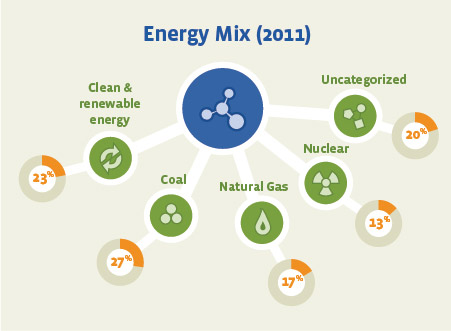Facebook Shares 2011 Energy + Carbon Footprint Data
Now that Facebook's a properly official public company, it'll be doing things it never had to do before. Things like "being transparent." With the world watching, the company is a much different place, but even before the IPO, it looks as if Facebook was tracking something that'll be highly important in the years ahead. Following in the footsteps of countless other technology mainstays, Facebook has just announced its 2011 carbon footprint, energy mix and energy use. Why? According to the company, it's making the move because it "believes in the power of openness, and because it hopes that adding another data point to our collective understanding of our industry’s environmental impact will help us all keep improving." Wise words.
Looking back at the banner year that was 2011, Facebook found that the total annual carbon footprint per monthly active Facebook user is 269 grams. To put this number into context, one person’s Facebook use for all of 2011 had roughly the same carbon footprint as one medium latte. Or three large bananas. Or a couple of glasses of wine. Facebook’s total energy use from office space, data centers and other facilities was approximately 532 million kWh. Facebook’s greenhouse gas emissions—also known as our carbon footprint—from data centers, office space, employee commuting, employee air travel, data center construction and server transportation totaled approximately 285,000 metric tonnes of CO2e (carbon dioxide equivalent, which includes greenhouse gases CO2, CH4, N2O, and HFCs). Facebook’s energy mix was 23% clean and renewable, 27% coal, 17% natural gas, 13% nuclear and 20% uncategorized (energy that’s purchased by utilities on the spot market and can include any or all of the above categories).

When talking about the harsh realities of using energy, Facebook admits that its eco-friendly nature may not shine immediately. Still, the company has long term goals to become more green, with a company goal to derive at least 25% of our energy mix from clean and renewable sources by 2015. It's pretty fascinating that what appears to be a simple social network takes tons and tons of energy to run 24/7. And a little perspective never hurt anyone.
Looking back at the banner year that was 2011, Facebook found that the total annual carbon footprint per monthly active Facebook user is 269 grams. To put this number into context, one person’s Facebook use for all of 2011 had roughly the same carbon footprint as one medium latte. Or three large bananas. Or a couple of glasses of wine. Facebook’s total energy use from office space, data centers and other facilities was approximately 532 million kWh. Facebook’s greenhouse gas emissions—also known as our carbon footprint—from data centers, office space, employee commuting, employee air travel, data center construction and server transportation totaled approximately 285,000 metric tonnes of CO2e (carbon dioxide equivalent, which includes greenhouse gases CO2, CH4, N2O, and HFCs). Facebook’s energy mix was 23% clean and renewable, 27% coal, 17% natural gas, 13% nuclear and 20% uncategorized (energy that’s purchased by utilities on the spot market and can include any or all of the above categories).

When talking about the harsh realities of using energy, Facebook admits that its eco-friendly nature may not shine immediately. Still, the company has long term goals to become more green, with a company goal to derive at least 25% of our energy mix from clean and renewable sources by 2015. It's pretty fascinating that what appears to be a simple social network takes tons and tons of energy to run 24/7. And a little perspective never hurt anyone.

